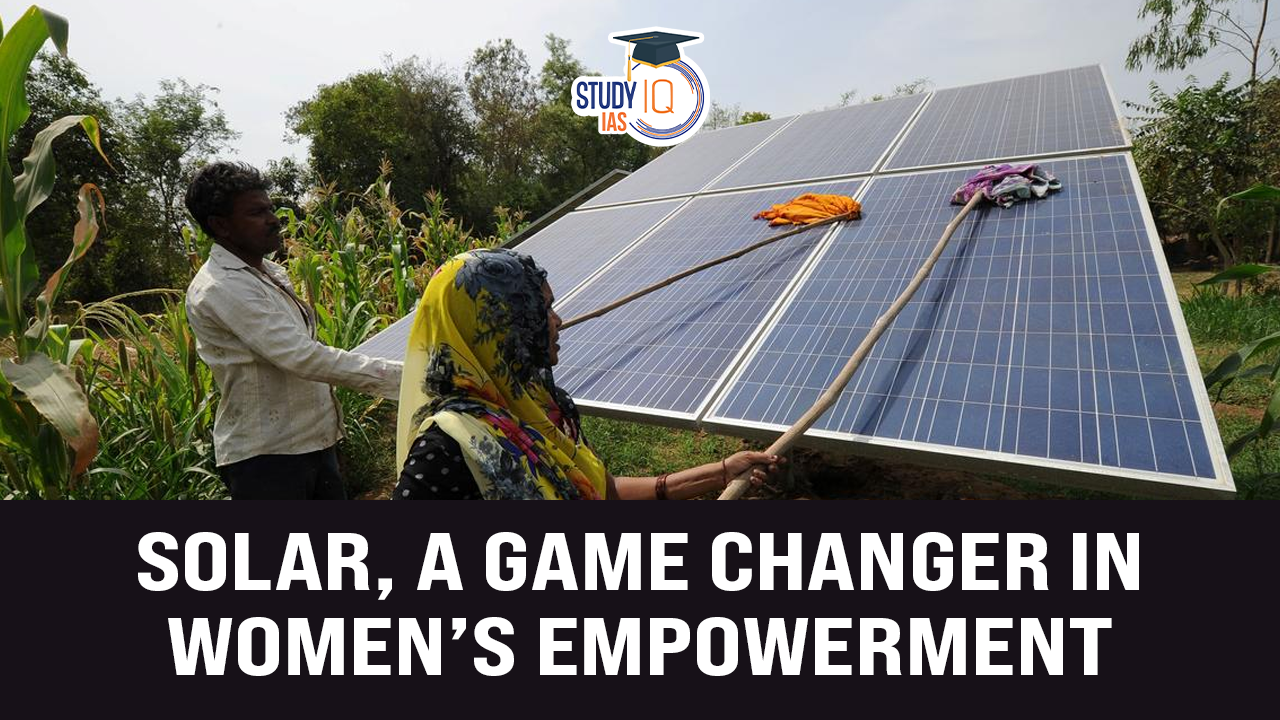Table of Contents
Context
Solar energy’s evolution towards decentralisation empowers society by enabling local energy generation, fostering economic inclusion, particularly for women and marginalised communities, while supporting sustainable, community-driven growth and resilience.
Background
- In 1884, Charles Fritts installed the first rooftop solar array, using simple, low-efficiency cells.
- Today, solar energy has evolved beyond powering natural processes like photosynthesis.
- It’s become a powerful tool for generating electricity directly in people’s homes, unlike traditional sources such as coal, oil, or nuclear power, which rely on large power plants and transmission lines.
- Solar energy allows electricity to be generated right where it’s needed, reducing reliance on central power sources.
- This shift brings benefits that go beyond convenience.
- It empowers individuals and communities, making them active participants in the energy economy.
- This has a significant social impact, especially for women and marginalised communities, who often face the greatest challenges due to limited access to energy.
Impact of Decentralization of Solar Energy
- Empowerment and Economic Inclusion: Solar decentralisation places energy production in the hands of individuals and communities, empowering them socially, economically, and developmentally.
- It boosts women’s participation in the economy.
- Example: Women salt farmers in Gujarat’s Little Rann of Kutch increased their income by 94% and reduced CO₂ emissions by up to 1,15,000 metric tons annually by switching to solar pumps.
- Advancing Women’s Financial Inclusion: Solar employs more women than any other energy sector, with women making up 40% of the solar photovoltaic workforce as of 2022.
- Solar projects such as Barefoot College (India) and Solar Sister (Africa) train women as solar engineers, enhancing income potential and improving health and safety.
- Economic Upliftment of Marginalised Communities: Decentralised solar alleviates the “resource curse” seen in coal regions, supporting sustainable development without the adverse environmental impacts.
- It provides clean energy to off-grid areas, stimulating local economies and creating climate resilience through distributed power generation.
- It boosts women’s participation in the economy.
Challenges Facing Solar Energy Adoption
- Geographical Imbalance: Most solar investments are concentrated in developed nations, while developing countries, especially in Africa, lag due to limited funding and support.
- Sectoral Imbalance: Large-scale solar farms attract the majority of investment, leaving smaller but impactful applications like solar pumps and cold storage overlooked.
- Manufacturing Concentration and Supply Chain Issues: Reliance on two primary manufacturing countries for solar components disrupts supply chains and raises prices, a challenge expected to grow with rising demand.
- Recycling and Waste Management: Solar panels and batteries create waste management challenges. Without established recycling and circularity measures, these materials risk adding to environmental waste.
- Effective recycling guidelines, producer responsibility, and mobile recycling solutions are needed to address the life cycle of solar technologies.
Recommendations for a Just Energy Transition
- Policy Integration and Gender-Inclusive Approach: A gender-sensitive lens in energy policies is crucial for inclusivity, positioning women not only as beneficiaries but as agents of change.
- Integrating electrification initiatives with agriculture, rural development, and other sectors ensures that energy access addresses the needs of all community members, particularly women.
- Focus on Recycling and Circular Economy: Develop clear waste management guidelines for solar technologies, ensuring their environmental footprint remains low.
- Encourage producer responsibility and end-of-life management collaboration, which will foster efficient recycling and enhance sector sustainability.
- Support Localised Solutions and Smaller-Scale Projects: Prioritise funding for community-oriented solar solutions like solar pumps, rooftop installations, and cold storages to meet rural and small-scale energy needs.
- Strengthen government and market mechanisms to make home-level solar solutions more accessible and affordable, supporting widespread adoption.
- Enhance Community Engagement: Formal organisations (e.g., self-help groups, farmer-producer organisations) and rural energy committees are instrumental in planning, installing, and maintaining mini-grids, ensuring comprehensive energy access.


 GPS Spoofing and Its Impact in India: A ...
GPS Spoofing and Its Impact in India: A ...
 Amrit Gyaan Kosh Portal: A Comprehensive...
Amrit Gyaan Kosh Portal: A Comprehensive...
 UpLink Initiative: Launched by World Eco...
UpLink Initiative: Launched by World Eco...





















